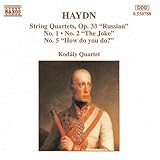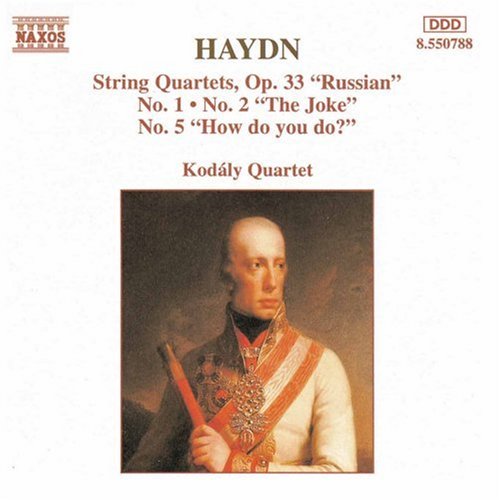Franz Joseph Haydn Album: «Haydn: String Quartets, Op. 33 "Russian", No. 1, No. 2 "The Joke", No. 5 "How do you do?"»

- Customers rating: (4.6 of 5)
- Title:Haydn: String Quartets, Op. 33 "Russian", No. 1, No. 2 "The Joke", No. 5 "How do you do?"
- Release date:1995-03-21
- Type:Audio CD
- Label:Naxos
- UPC:730099578820
I ordered this CD and its mate with the other three quartets of Opus 33. My interest in these six quartets was originally their importance as models for Mozart's six late quartets dedicated to Joseph Haydn. However, I discovered that these are great works on their own, in the same class as Mozart's. The differences between them show the differences in Mozart and Haydn's temperaments, rather than any difference in genius of the composer or excellence of workmanship.
The performances of the Kodaly Quartet are uniformly first-rate, and the quality of the reproduction is excellent.
The Naxos/Kodaly Quartet series of the complete Haydn string quartets offers a great way to acquire outstanding, historically ground-breaking music in warm, good humored and eventful performances that perfectly capture the spirit of the composer.
The Naxos/Kodaly Quartet series of the complete Haydn string quartets offers a great way to acquire outstanding, historically ground-breaking music in warm, good humored and eventful performances that perfectly capture the spirit of the composer.
These Kodaly Qt. performances of three of the six Haydn op. 33 Quartets, like most of the Kodaly performances of Hadyn in their remarkable bargain series for Naxos, are warm, funny, charming and eventful performances. I've collected nine discs in this series and plan to collect more.
... if you spend your money buying the performances of Haydn's Quartets by the Kodaly Quartet on separate disks. They've all be included in the Naxos 25-CD "Complete Haydn Quartets" bargain box, and unlike many such bargains, they come with an ample booklet of historical and musicological notes. To my ears, although not all the Kodaly interpretations are equally impressive, the Big Box has come to seem quite a wonderful acquisition.
Three of the six quartets from Opus 33 have nicknames in English -- The Joke, The Bird, & How Do You Do -- almost a guarantee that they will be more familiar and more popular with audiences. The six were split into two CDs in this original release, with the first CD containing #s 5, 2, & 1, while the second CD contains #s 3, 6, and 4. In other words, the most affective and complex three are on one disk, the second, and the most facile and galante are on the other, the first. That seems uncommonly 'decent' for a recording company so i preseume it was the choice of the musicians. If you decide to buy one CD, make sure it's the CD that features #s 3, 6, & 4, or "The Joke" will be on you!
In general, Opus 33 seems to me to be a sort of retrenchment in to the galante lightweight style of earlier Rococo chamber music, after the bold structural complexity and serious tenor of the Sun quartets, Opus 20. Especially the three compositions on CD1 step backward from the 'classical' distribution of musical interest across all four voices of the quartet; as in earlier works, most of the melodic 'attention' is focused on the first violin. That, unfortunately, reveals the weakest qualities of the Kodaly ensemble and of all quartets performing on 'modern' instruments. The timbre of the first violin, so far removed from the lower voices, sounds wiry and scrape-ish. Perhaps that's why the three quartets on CD2 sound so much better - not because they're more ably performed but because they aren't so exposed. In any case, I'm giving CD1 three stars and CD2 five stars.

